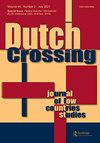Reading White Innocence across Disciplines in the Low Countries
IF 0.4
3区 历史学
Q1 HISTORY
Dutch Crossing-Journal of Low Countries Studies
Pub Date : 2022-09-02
DOI:10.1080/03096564.2022.2144602
引用次数: 0
Abstract
This special issue around White Innocence: Paradoxes of Colonialism and Race (2016) by Gloria Wekker grew out of an interdisciplinary conference hosted by the University of Liège in Belgium in 2021. The conference celebrated Wekker’s work and was occasioned by some notable anniversaries in the university’s history. In 2017, the University of Liège celebrated its bicentenary, a historical moment also for Dutch Studies as an academic discipline, for it was in Liège, in French-speaking Wallonia, that a chair for Dutch Literature and Eloquence was established in 1817, the very first outside the Dutch language area. The chair was created in the context of the United Kingdom of the Netherlands, the brief political union of present-day Belgium, the Netherlands and the Grand-Duchy of Luxembourg from 1815 to 1830. On the instigation of King William I, who took a keen interest in educational matters, three universities were established in the southern parts of the realm: in Liège, in Ghent and in Louvain (its older university having been abolished during the Napoleonic era). The first professor to occupy the chair of Dutch Studies in Liège was Johannes Kinker, the famous philosopher, poet, critic and all-round man of letters. Following the Belgian Revolution in 1830, Kinker was forced to return to his native city of Amsterdam. In the aftermath of the revolution, the Faculty of the Humanities was closed for a few years, but when it reopened in 1837, Dutch Studies was still part of the academic curriculum, initially in a much reduced form. The bicentenary of Dutch Studies at Liège was commemorated in various ways. A tangible memento was the publication of a monograph painting a detailed picture of the在低地国家跨学科阅读白色的纯真
本期特刊《白色纯真:殖民主义与种族的悖论》(2016)由格洛丽亚·韦克尔(Gloria Wekker)撰写,源于2021年比利时li大学主办的一次跨学科会议。这次会议是为了纪念Wekker的工作,并在大学历史上的一些重要纪念日举行。2017年,里奥尔奇大学庆祝了它的200周年纪念,这也是荷兰研究作为一门学科的历史时刻,因为1817年,在法语瓦隆地区的里奥尔奇,荷兰文学和雄辩学的主席被设立,这是荷兰语地区以外的第一个主席。主席是在荷兰联合王国的背景下创建的,荷兰联合王国是1815年至1830年期间由今天的比利时、荷兰和卢森堡大公国组成的短暂政治联盟。在国王威廉一世的鼓动下,他对教育事务有着浓厚的兴趣,在王国的南部地区建立了三所大学:利弗里奇、根特和鲁汶(旧大学在拿破仑时代被废除)。第一位担任荷兰语研究的教授是约翰内斯·金克,他是著名的哲学家、诗人、评论家和多才多艺的文学家。1830年比利时革命后,金克被迫回到他的家乡阿姆斯特丹。在革命之后,人文学院关闭了几年,但当它在1837年重新开放时,荷兰研究仍然是学术课程的一部分,最初的形式大大减少。利弗里奇荷兰研究200周年纪念活动以各种方式进行。一个有形的纪念品是出版了一本专著,详细描绘了这幅画
本文章由计算机程序翻译,如有差异,请以英文原文为准。
求助全文
约1分钟内获得全文
求助全文

 求助内容:
求助内容: 应助结果提醒方式:
应助结果提醒方式:


